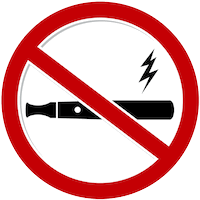Just as public health experts around the world have been warming up to vaping, the government of Hong Kong is trying to institute a total ban on e-cigarettes. The proposed ban would make it illegal to sell, manufacture or import e-cigs within the territory.
Hong Kong Bans E-Cigarette Sales

Hong Kong Chief Executive Carrie Lam Cheng Yuet-ngor officially declared the ban in October 2018, but the government has been threatening to prohibit e-cig sales for over a year. As recently as June 2018, the government decided that e-cigs would be regulated as tobacco products; however, due to pressure from anti-vaping activists, Hong Kong officials announced a sudden reversal of that policy.
The ban would also apply to heat-not-burn tobacco products. Unlike e-cigs, heat-not-burn products contain actual tobacco, but they work on the same principle as vaping: The tobacco is slowly heated to vaporize the nicotine. No combustion is involved, but heat-not-burn products are indeed tobacco products, so they are likely more dangerous than e-cigs.
Ironically, tobacco cigarettes remain legal despite decades of evidence linking smoking to heart disease, cancer and dozens of other health problems. This inconsistency is likely due to the fact that tobacco sales bring enormous tax revenue to the government. E-cigs simply can’t compete with Hong Kong’s $1.2 billion tobacco market.
The Status of Vaping in China vs. Hong Kong
Hong Kong was a British colony until 1997 when it joined the People’s Republic of China under the condition of somewhat autonomous rule. While e-cigs remain legal throughout the rest of China, Hong Kong has the ability to declare its own laws within its borders. Nonetheless, since goods travel freely between Hong Kong and the rest of China, the government will be unable to stop people from bringing their e-cigs from the mainland.
In fact, Hong Kong is just south of Shenzhen, China, also known as the vaping production capitol of the world. Therefore, the ban will probably stop short of criminalizing vaping altogether. Still, vapers in Hong Kong could be forced back into smoking if e-cigs become harder to obtain.
Modern e-cigs were actually invented in China by a doctor who wanted to provide a safer alternative for smokers. A decade of research has repeatedly led to the conclusion that vaping is about 95 safer than smoking tobacco, yet many public health officials across the globe remained resistant to e-cigs until very recently.
As more smokers have switched to vaping, people are starting to realize the benefits of providing a safer way to satiate nicotine cravings. Unfortunately, health experts in Hong Kong are bowing to pressure from advocacy groups that rely on outdated science to push their political agenda.
Why Are E-Cigarettes Illegal in Hong Kong?

The Hong Kong Council on Smoking and Health, the College of Community Medicine and the Medical Association of Hong Kong collectively voiced their displeasure at the government’s plan to regulate rather than ban e-cigs. In response, public health experts in Canada and the U.S. have joined together and sent a letter to Hong Kong officials imploring them to reconsider the decision.
“We believe this campaign is ill-conceived and inconsistent with the international evidence,” the letter states. “We are writing to urge the government to resist this pressure and to use ‘risk-proportionate’ regulation rather than prohibition to exploit the opportunities and minimize any risks associated with these new technologies.”
To be fair, Hong Kong’s government is following the advice of the World Health Organization, which the authors of the letter accuse of cherry picking research to paint e-cigs in a negative light. Opponents of vaping often cite concerns about the appeal of e-cigs to young people, which is a serious concern, but it’s not a reason to keep e-cigs out of the hands of adults who are trying to beat their tobacco habit. Furthermore, while there needs to be more research on the long term health impacts of vaping, the fact that vaping is safer than smoking is indisputable.
“Why would a government prevent a smoker [from] switching to a much lower-risk product and, in doing so, perhaps save his own life using his own initiative and at his own expense?” the authors ask Hong Kong public health officials. The letter continues: “We respectfully ask by what logical, scientific or ethical argument does it make sense to ban the much safer products while leaving the highly harmful dominant product, cigarettes, widely available throughout Hong Kong?”
The Future of E-cigs in Hong Kong
If all goes as planned, Hong Kong will soon join 27 other countries that have completely banned e-cigarette use and import. Meanwhile, public health advocates in the U.K. and New Zealand are actually endorsing vaping as a safer substitute for smoking. Hopefully, the rest of the world will soon catch up and realize the potential for e-cigs to save lives.






